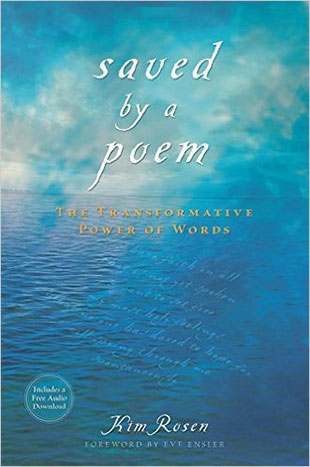This astonishing book arrived in our lives at just the right moment and has helped us focus our attention and enthusiasm on a blog we are preparing to launch on "Sacred Poetry." We have always had a special place in our hearts for this mystical medium that both refreshes and refuels us. Poets notice things that we overlook in our haste and hurry and they tutor us in the art of long looking. They recognize spiritual teachers all around us and help us to see the divine grace operating in our lives. Kim Rosen calls herself a spoken-word artist, a teacher of self-inquiry as well as a poet. She has given poetry concerts, lectures, and workshops in venues from cathedrals to juvenile lockdown facilities. Early in this book, Rosen describes what spending time with a poem is like for her:
"Like singing a song you love or blasting it on the stereo, like reading a favorite Psalm or the Heart Sutra several times a day, it is a choice to fill your thoughts with what you hold precious and believe in, instead of the plethora of commercial jingles, self-criticisms, or anxieties about the past and the future that usually overrun the mind. When I focus on a poem I love, my thoughts stop spinning and become quiet. My body relaxes. My breathing finds the rhythm of the poem. Whether I'm in the car, on the subway, walking on the beach, or sitting on a meditation cushion, that poem becomes as real a refuge as any church, synagogue, or mosque."
The author maintains this high level of keen imagery and insight throughout as she celebrates the transformative powers of poetry. Rosen claims that this communication medium was created to be experienced in the flesh and spoken aloud: "Made of breath, sound, rhythm, meaning, and silence, a poem is a physical event." In many parts of the world, especially the Middle East, poems are recited at social gatherings, in homes, or on the street. Although often written alone and in silence, they are meant to be spoken out loud and embodied.
Rosen shares how poetry saved her life while she was in a pit of depression along with her experiment in learning poems she loves by heart. Mary Oliver, an exquisite poet, has said: "Poetry is a life-cherishing force. For poems are not words, after all, but fires for the cold, ropes let down to the lost, something as necessary as bread in the pockets of the hungry. Yes, indeed."
The author makes a rousing case for seeing and experiencing poetry as good medicine and for awakening to the heart of the world. Rosen is convinced that pleasure, curiosity, and love should be the criteria by which we choose poems as our companions and soul friends. There is a fine chapter on "The Anatomy of a Poem" which answers many questions readers may have about this rich source of inspiration and nourishment. Rosen shares her intimacy with her favorite poems throughout the book and puts one on display at the end of each chapter. She is awed by the kind of holy communion that can take place when poems are recited by heart:
"When you speak the poems you love — whether to yourself or someone else or many others — a mysterious phenomenon can occur. The sounds and silences become almost palpable with a resonance that seems beyond the sum of the parts. You and whoever is listening are gathered into a kind of grace. The spoken poem smoothes the rough edges of fragmented attention — harmonizing, focusing, and unifying everyone present. As Rumi says of his teacher, Shams, 'You make my raggedness silky.' "
You can tap into this spiritual energy by listening to the inspirational CD included in Saved by a Poem. Here, Joan Borysenko, Andrew Harvey, Jane Hirshfield, Robert Holden, Elizabeth Lesser, Thomas Moore, Geneen Roth, Christiane Northrup, and others read a favorite poem and comment on its personal significance to them.
